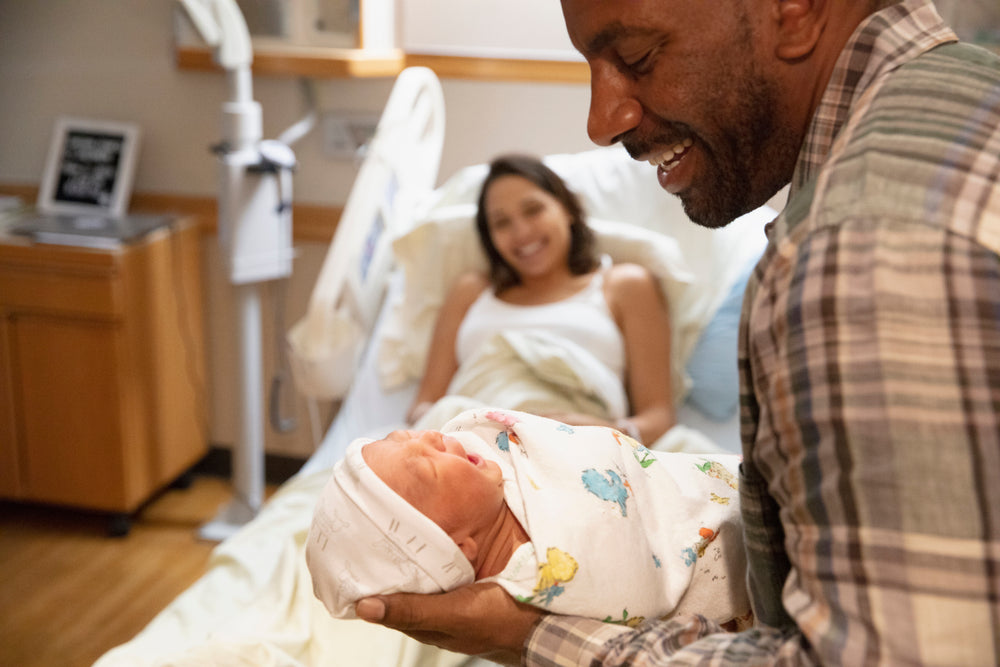It’s finally here! Labour day has arrived. Your partner is in active labour, you’re where you planned to be (home, the birth centre or hospital), and it’s actually happening – your baby is coming!
Top tip – don’t wait until then before reading this blog on how you can be the best birth partner possible!
Your role as a birth partner
If there is one single thing that every birth partner needs to know, it’s that keeping the birth room as calm and relaxed as possible is the best way to support those magical labour hormones. Even if you feel stressed, try to look as though you’re calm!
It may sound strange to say that relaxing in labour is important. After all, how can someone be relaxed going through a painful experience? Here’s something astonishing: When women and people give birth, their brains release chemicals called endorphins which are brilliant at helping them to relax and sink into “labour land” – a slightly lowered state of consciousness where she feels less pain. When people around her are calm, her endorphins can flow.
You can also help this process by using a calm, lowered voice, dimming the lights and/or drawing curtains or blinds, and using positive, supportive words to let her know how well she’s doing. You can help her to get into positions that feel most comfortable such as on all fours, or leaning over the bed. You can raise it or lower it to the level that feels good to her – the midwife will show you how. Try to encourage her to not lie on her back as this isn’t a good position for labour or birth.
Being your partner’s advocate
If your partner has written a birth plan it is essential that you read and understand it in advance of labour! You will be responsible for ensuring that every midwife or doctor that cares for your partner knows what’s important to her.
If she decides to change her mind about things in her birth plan, it’s you who needs to ensure that this is listened to by the staff. If labour looks like it’s going in a different direction than you’d hoped, you are going to be an important person for her to talk to, to help her to make her decisions about what’s right for her.
It can be helpful if you’ve talked in advance about different options, depending on how things go. For instance, if she finds she needs pain relief, what would she like to try? Will she go straight for the epidural or would she prefer to try a birth pool, or an opiate medication? Would she never have an epidural under any circumstances? You can help to communicate these wishes to the midwives if you know them – although if she changes her mind on the day, the midwife will go with her decisions in the moment.
Take responsibility for your own wellbeing
If you’re hungry, eat. If you’re thirsty, drink. If you need the toilet, go pee! If it’s in a calm part of labour and you need to rest, that’s fine. Take a nap. You need to look after yourself so you’re ready and available to look after her. She needs you to be fed and energetic!
Top tip – if she’s starting to feel like pushing, you’ve missed your chance of a kip!
Another key element of your own wellbeing is to ensure that you bring any medications you may need with you if you leave your home for the birth, and don’t forget to take them. It might be worth setting an alarm as it can be very easy to lose track of time during labour. Similarly, if your partner needs any regular medication, make sure you take responsibility for that, too – but tell the midwives and doctors about it so they know if there’s any interactions with medications she may be offered during her labour.
Your emotions on your baby’s birth day
Whether this is your first baby, or whether you’re an old hand at this business of giving birth, your partner going into labour is still going to trigger a whole range of emotions. You’ll often hear that labour isn’t about you, but it really is! Your role in the birth is to be supportive of your partner, but your feelings matter too. Many Dads and partners find that the support of a close friend or family member, even if just by phone message, can mean that they can get through challenging moments while still staying calm and present with their partner.
Summary
It’s the day you’ve both been waiting for. You’re finally going to meet your baby!
As the birth partner and Dad-to-be you have a unique role, one that no one else in the room can fulfil. You have that loving connection with your partner and know her wishes better than anyone. Don’t be afraid to take control of the setup of the room, ensuring the lights are lowered and your partner can get into the position she wants to be in.
And remember to look after yourself along the way!


















